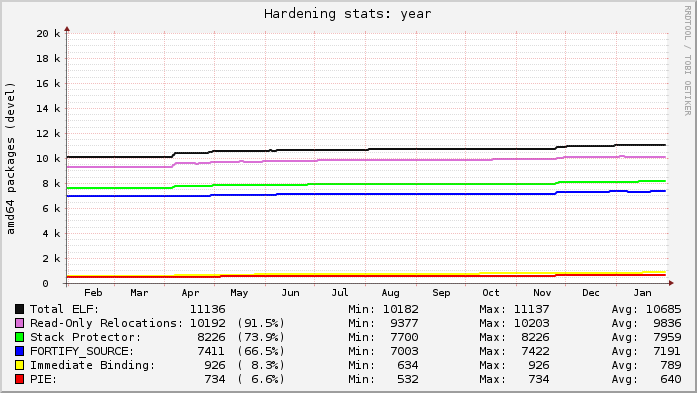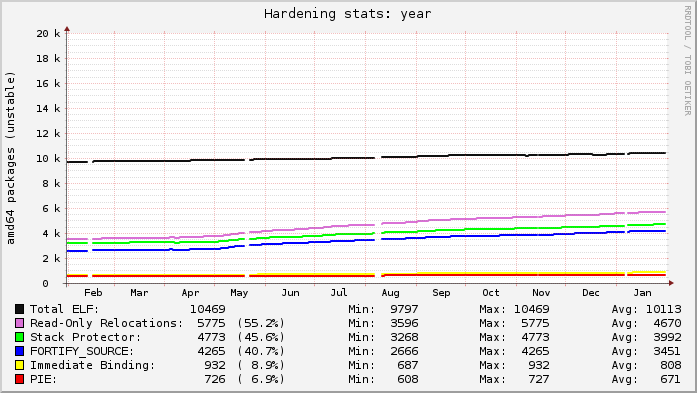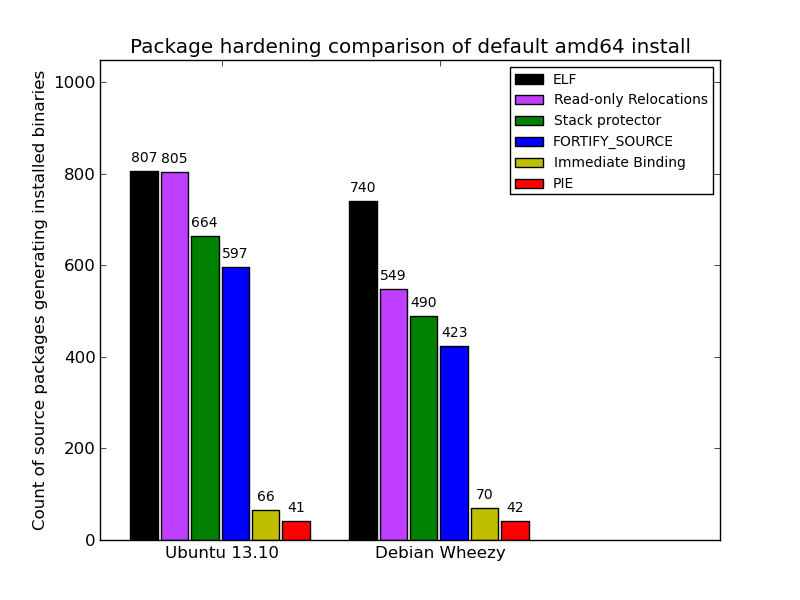Back in 2006, the compiler in Ubuntu was patched to enable most build-time security-hardening features (relro, stack protector, fortify source). I wasn’t able to convince Debian to do the same, so Debian went the route of other distributions, adding security hardening flags during package builds only. I remain disappointed in this approach, because it means that someone who builds software without using the packaging tools on a non-Ubuntu system won’t get those hardening features. Think of a sysadmin trying the latest nginx, or a vendor like Valve building games for distribution. On Ubuntu, when you do that “./configure && make” you’ll get the features automatically.
Debian, at the time, didn’t have a good way forward even for package builds since it lacked a concept of “global package build flags”. Happily, a solution (via dh) was developed about 2 years ago, and Debian package maintainers have been working to adopt it ever since.
So, while I don’t think any distro can match Ubuntu’s method of security hardening compiler defaults, it is valuable to see the results of global package build flags in Debian on the package archive. I’ve had an on-going graph of the state of build hardening on both Ubuntu and Debian for a while, but only recently did I put together a comparison of a default install. Very few people have all the packages in the archive installed, so it’s a bit silly to only look at the archive statistics. But let’s start there, just to describe what’s being measured.
Here’s today’s snapshot of Ubuntu’s development archive for the past year (you can see development “opening” after a release every 6 months with an influx of new packages):

Here’s today’s snapshot of Debian’s unstable archive for the past year (at the start of May you can see the archive “unfreezing” after the Wheezy release; the gaps were my analysis tool failing):

Ubuntu’s lines are relatively flat because everything that can be built with hardening already is. Debian’s graph is on a slow upward trend as more packages get migrated to dh to gain knowledge of the global flags.
Each line in the graphs represents the count of source packages that contain binary packages that have at least 1 “hit” for a given category. “ELF” is just that: a source package that ultimately produces at least 1 binary package with at least 1 ELF binary in it (i.e. produces a compiled output). The “Read-only Relocations” (“relro”) hardening feature is almost always done for an ELF, excepting uncommon situations. As a result, the count of ELF and relro are close on Ubuntu. In fact, examining relro is a good indication of whether or not a source package got built with hardening of any kind. So, in Ubuntu, 91.5% of the archive is built with hardening, with Debian at 55.2%.
The “stack protector” and “fortify source” features depend on characteristics of the source itself, and may not always be present in package’s binaries even when hardening is enabled for the build (e.g. no functions got selected for stack protection, or no fortified glibc functions were used). Really these lines mostly indicate the count of packages that have a sufficiently high level of complexity that would trigger such protections.
The “PIE” and “immediate binding” (“bind_now”) features are specifically enabled by a package maintainer. PIE can have a noticeable performance impact on CPU-register-starved architectures like i386 (ia32), so it is neither patched on in Ubuntu, nor part of the default flags in Debian. (And bind_now doesn’t make much sense without PIE, so they usually go together.) It’s worth noting, however, that it probably should be the default on amd64 (x86_64), which has plenty of available registers.
Here is a comparison of default installed packages between the most recent stable releases of Ubuntu (13.10) and Debian (Wheezy). It’s clear that what the average user gets with a default fresh install is better than what the archive-to-archive comparison shows. Debian’s showing is better (74% built with hardening), though it is still clearly lagging behind Ubuntu (99%):

© 2014, Kees Cook. This work is licensed under a Creative Commons Attribution-ShareAlike 4.0 License.